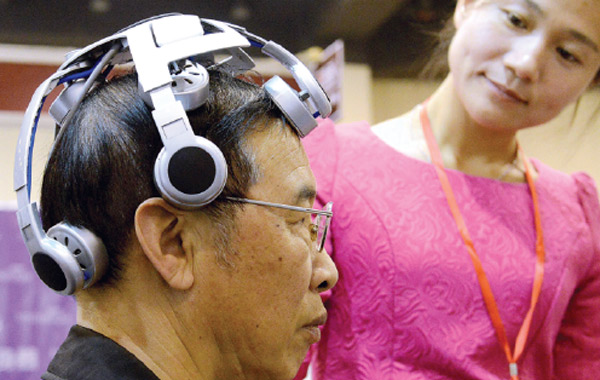
A man tests a brain disease treatment device at an international expo for the industry for seniors in Zhengzhou, capital of Henan province. The country faces an unprecedented challenge, with about 212 million aged 60 years or above.(Photo/China Daily)
By 2020, 243m people in China will be aged 60 years or above, requiring specialist healthcare services
China faces an unprecedented challenge: as of January this year, 15.5 percent of the population, or a staggering 212 million, were aged 60 years or above. But that is an opportunity, said some foreign investors such as the United Kingdom companies engaged in the business of elderly care services.
In late November, delegates representing 20 such UK companies participated in an expo entitled Healthcare is GREAT-Elderly Care Showcase in Shanghai, in an attempt to seek trade partnerships with Chinese investors, care deliverers and local governments.
One of the participating organizations was Annie Barr International, an accredited provider of high-quality healthcare training and consultancy services in the UK. ABI will open its training center in Shanghai in 2016, where it will prepare carers, nurses, doctors and healthcare support staff for China's elderly care sector.
Annie Barr, founder and director of ABI, said she has been noticing opportunities to help improve the elderly healthcare sector in China ever since her first visit to the country in 2014.
"It was clear to me that although the (aging) residents seemed happy and were cared for, the environment, standards and the level of care were far from the ideal I was accustomed to," she said.
Seif Usher, Assistant Director for Healthcare, Life Sciences and Social Care for Eastern China, UK Trade and Investment, pointed out that apart from healthcare services, there are business opportunities in planning and delivering retirement living and care services.
Besides the UK, the Netherland companies and organizations are eyeing opportunities in China for healthcare services for senior citizens.
In late October, a delegation of 25 Netherlands companies led by Martin van Rijin, state secretary for health, welfare and sports of the Netherlands, signed cooperation agreements with a number of Chinese companies during a forum held in Shanghai. The agreements cover a wide range of areas like equipment, process management and healthcare.
Thanks to the agreements, a web-based app called RAIview, which can assess the health and wellbeing of an individual, has debuted in the Chinese market. RAIview was developed by the Netherlands Institute for Healthcare and Wellbeing.
It can monitor the elderly so that service providers could minimize risks in terms of their ability to provide timely critical services. Five State-owned enterprises and property developers have already started using RAIview, which is mainly targeted at wealthy senior citizens.
In tune with the new opportunity, some SOEs will convert a few of their properties into profitable elderly care institutions. Similarly, real estate developers will renovate some of their projects into elderly care and medicare communities.
The number of organizations using RAIview is expected to exceed 1,000 soon, according to Niu Min, general manager of Beijing Lianzhong Home Elderly Care Investment Management Co, one of the two companies that have introduced RAIview in China.
The size of the global elderly care market was just 200 million euros in 1998. Now, it has ballooned to 30 billion euros, according to van Rijin of the Netherlands.
"Europe is still recovering slowly from recession. The increasing cost of elderly care is exerting great fiscal pressure on governments. They need to come out with a long-term and sustainable medical service system by working closely with research institutions and privately owned companies. In the Netherlands, the government has been quite experienced in working with privately owned companies. The latter usually come up with many innovative ideas," he said.
Yu Yue, 30, who runs her own imported food business in Shanghai, appreciates such ideas. She and her parents admitted her 84-year-old grandfather in the US-funded Casade Healthcare in Shanghai last year after the old man slipped and suffered a hip fracture.
As people such as Yu are hard pressed for time managing jobs, careers or businesses, and also a lack professional knowledge of elderly care, they turn to specialist service providers.
"Apart from regular medical checkups and treatment (for minor ailments), carers at Casade give a massage to my grandpa every day. They also give him muscle practice to increase strength and avoid muscle atrophy," she said.
The number of such stories will likely grow as China's elderly population increases by 9.8 million every year, a growth rate exceeding that of newborns. By 2020, China will be home to 243 million 60+ citizens.
Their number will exceed 300 million by 2025, in line with their rapid growth rate over the last decade. In 2005, they constituted 13 percent of the total population but since 2011, their numbers grew by an annual 5 percent.
According to the United Nations, a country or region enters an aging stage once people aged 60 years or above are more than 10 percent of the population.
When a society ages at a fast clip, traditional ways of caring for the elderly at home or government healthcare centers prove inadequate, necessitating private sector services.
The market for elderly care in China is also expanding rapidly. From around 4 trillion yuan ($617 billion) in sales at present, it is estimated to grow to 13 trillion yuan in 2030 and 106 trillion yuan, or 33 percent of the country's GDP by 2050, according to the Chinese Academy of Social Sciences.


















































